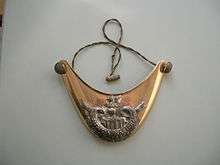gorget
English

Gorget
Etymology
From Old French gorgete, from gorge (“throat”).
Pronunciation
- IPA(key): /ˈɡɔːdʒɪt/
Noun
gorget (plural gorgets)
- (historical) A piece of armour for the throat.
- 1663, Hudibras, by Samuel Butler, part 1, canto 2
- About his neck a threefold gorget, / As rough as trebled leathern target
- Sir Walter Scott
- Unfix the gorget's iron clasp.
- 1968, Michael Moorcock, The Mad God's Amulet, Gollancz 2003, p. 209:
- Hawkmoon whipped his sword from the scabbard, leaped forward, and drove the blade into the throat of the warrior just below his gorget.
- 1999, George RR Martin, A Clash of Kings, Bantam 2011, p. 500:
- Renly lifted his chin to allow Brienne to fasten his gorget in place.
- 1663, Hudibras, by Samuel Butler, part 1, canto 2
- (historical) A type of women's clothing covering the neck and breast; a wimple.
- An ornament for the neck; a necklace, ornamental collar, torque etc.
- 1917, Washington Irving, The Legend of Sleepy Hollow:
- There was […] the golden-winged woodpecker, with his crimson crest, his broad black gorget, and splendid plumage […]
-
- (surgery) A cutting instrument used in lithotomy.
- A grooved instrument used in performing various operations; called also blunt gorget.
- (Can we find and add a quotation of Dunglison to this entry?)
- (zoology) A crescent-shaped coloured patch on the neck of a bird or mammal.
- (Britain, dialectal, Cornwall) A hake caught in a net set for other fish.
Part or all of this entry has been imported from the 1913 edition of Webster’s Dictionary, which is now free of copyright and hence in the public domain. The imported definitions may be significantly out of date, and any more recent senses may be completely missing.
(See the entry for gorget in Webster’s Revised Unabridged Dictionary, G. & C. Merriam, 1913.)
Derived terms
- gorget hummer
- gorgeted
Translations
armour
women's clothing
|
ornament for the neck
|
This article is issued from
Wiktionary.
The text is licensed under Creative
Commons - Attribution - Sharealike.
Additional terms may apply for the media files.